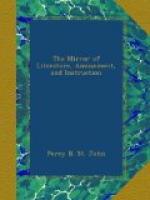* * * * *
POTATOES.
A few years after the discovery, potatoes were carried to Spain at first as sweetmeats and delicacies. Oviedo says that “they were a dainty dish to set before the king,” Labat describes potatoes a hundred years ago, as cultivated in Western Africa, and says of them, “Il y en a en Irlande, et en Angleterre,” and that he had seen very good ones at Rochelle.
* * * * *
PAINTING
Represents nature, or poetic nature at the most, and, therefore, addresses itself as much as poetry does to the feeling and imagination of man. Though it deals in nature exalted by genius, embellished by art and purified by taste, still it is nature, still it makes its appeal to the men of this world, and by them it is applauded or condemned. It works for men, and not for gods; therefore every man, as far as his taste is natural and sound, is a judge of its productions.—For. Rev.
* * * * *
LAVER.
Such of our readers as are not addicted to epicurism may have been somewhat puzzled at the display of “Fine Fresh Laver” in the Italian warehouses and provision shops of the metropolis. The truth is, laver is a kind of reddish sea-weed, forming a jelly when boiled, which is eaten by some of the poor people in Angus with bread instead of butter; but which the rich have elevated into one of the greatest dainties of their tables. In Scotland, laver is called slake; and Dr. Clarke mentions that it is used with the fulmar to make a kind of broth, which constitutes the first and principal meal of the inhabitants. It is curious to know that what is eaten at a duchess’s table in Piccadilly as a first-rate luxury, is used by the poor people of Scotland twice or thrice a day. It is an expensive dish; but knowledge of this fact may perhaps abate its cost.
* * * * *
GARDENS.
Ferdinand I. of Naples prided himself upon the variety and excellence of the fruit produced in his royal gardens, one of which was called Paradise. Duke Hercules, of Ferrara, had a garden celebrated for its fruits in one of the islands of the Po. The Duke of Milan, Ludovico, carried this kind of luxury so far, that he had a travelling fruit-garden; and the trees were brought to his table, or into his chamber, that he might with his own hands gather the living fruit.
* * * * *
SNUFF.
Even among the rudest and poorest of the inhabitants of Scotland, and at a period when their daily meal must have been always scanty, and frequently precarious, one luxury seems to have established itself, which has unaccountably found its way into every part of the world. We mean tobacco. The inhabitants of Scotland, and especially of the Highlands, are notorious for their fondness for snuff; and many were




